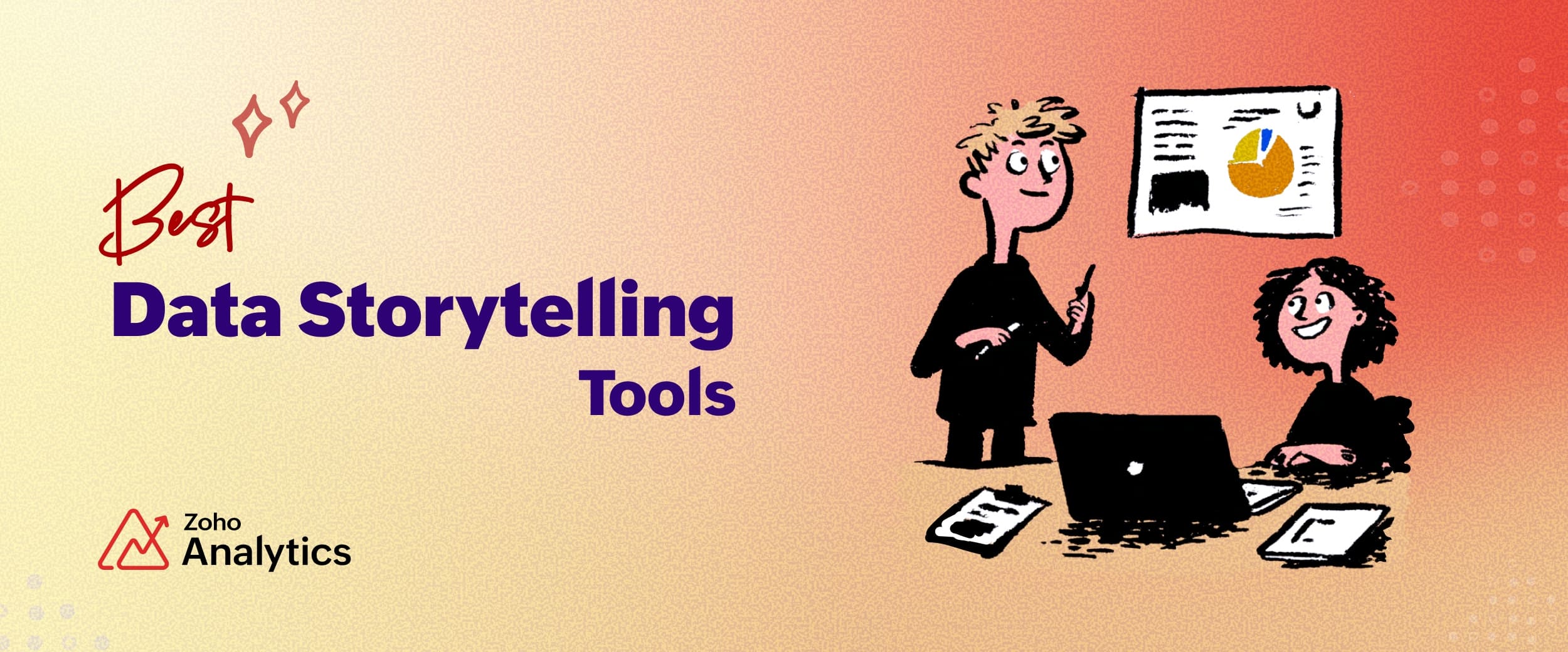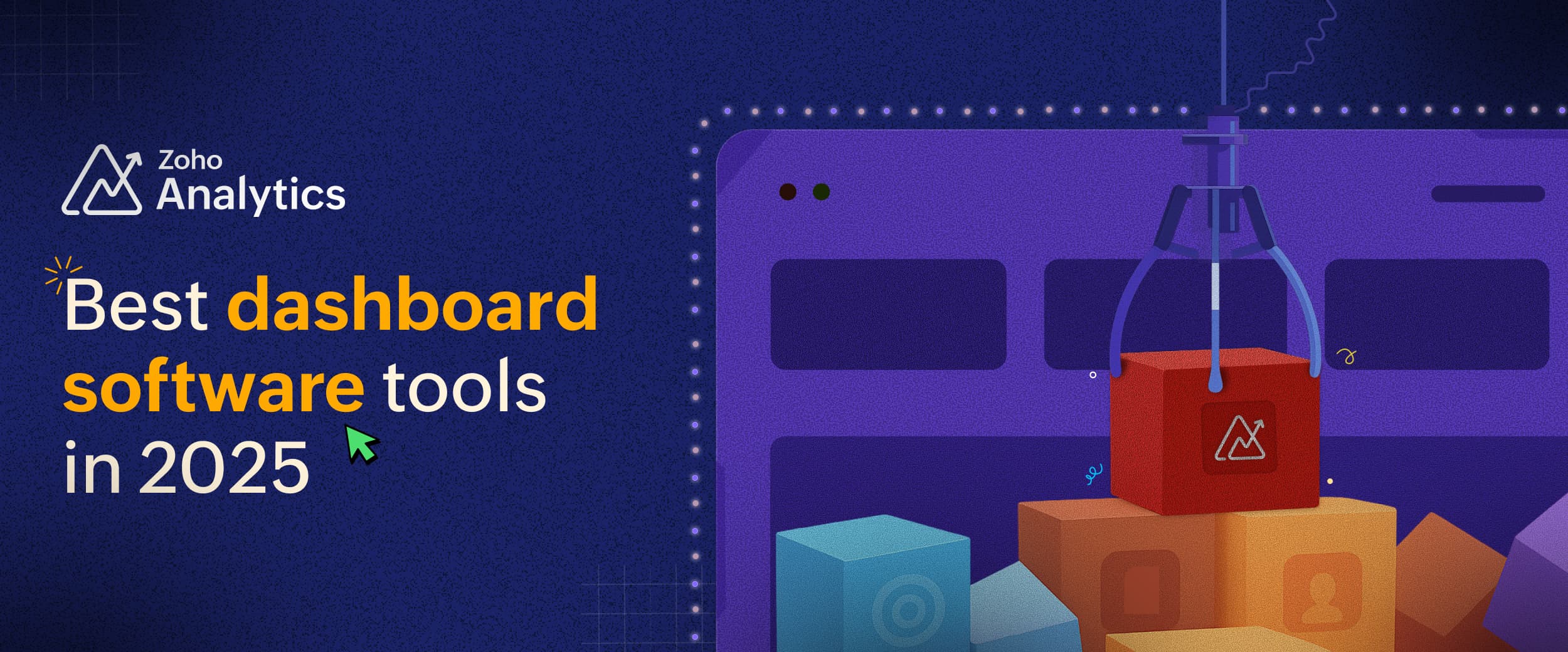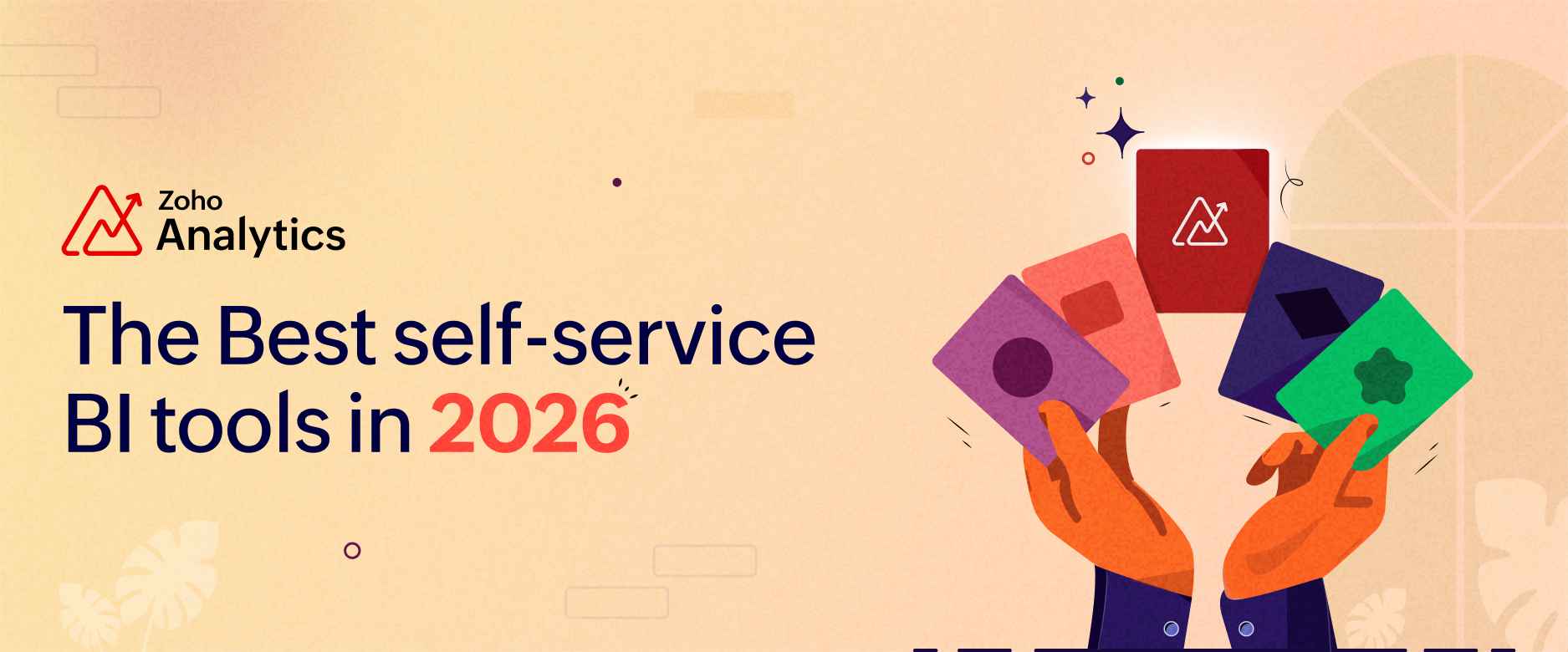- HOME
- BI & Analytics
- Top Qlik alternatives in 2026
Top Qlik alternatives in 2026
- Last Updated : February 13, 2026
- 480 Views
- 6 Min Read
Business intelligence (BI) tools have become the backbone of successful organizations. As businesses generate a vast amount of data daily—from customer interactions to operational workflows to market analytics—the real challenge lies in transforming this data into meaningful and actionable insights. The right BI tool doesn't just process data; it also enables leaders to discover opportunities, enhance operations, and sustain a competitive advantage.
In this business landscape, Qlik stands out as a prominent player. It's recognized for its innovative associative data engine that allows users to explore connections within their data. Qlik's approach enables dynamic and intuitive data exploration, unlike traditional linear query tools. From unparalleled freedom uncovering insights to rich-looking dashboards, Qlik has made its mark among data analysts and decision-makers.
However, even a platform as capable as Qlik has its limitations. Its complex learning curve can make onboarding difficult for teams with limited technical expertise, often requiring significant training to unlock its full potential. Additionally, its pricing model, while suitable for enterprises, may be less accessible for small and mid-sized businesses. Lastly, Qlik's collaborative capabilities may not offer the seamless experience some modern alternatives provide.
As businesses continue to evolve, their expectations for BI tools are shifting toward ease-of-use, affordability, and advanced analytics (like AI-powered analytics). While Qlik remains a strong choice, these evolving demands have prompted many organizations to seek alternatives that better align with their goals and priorities.
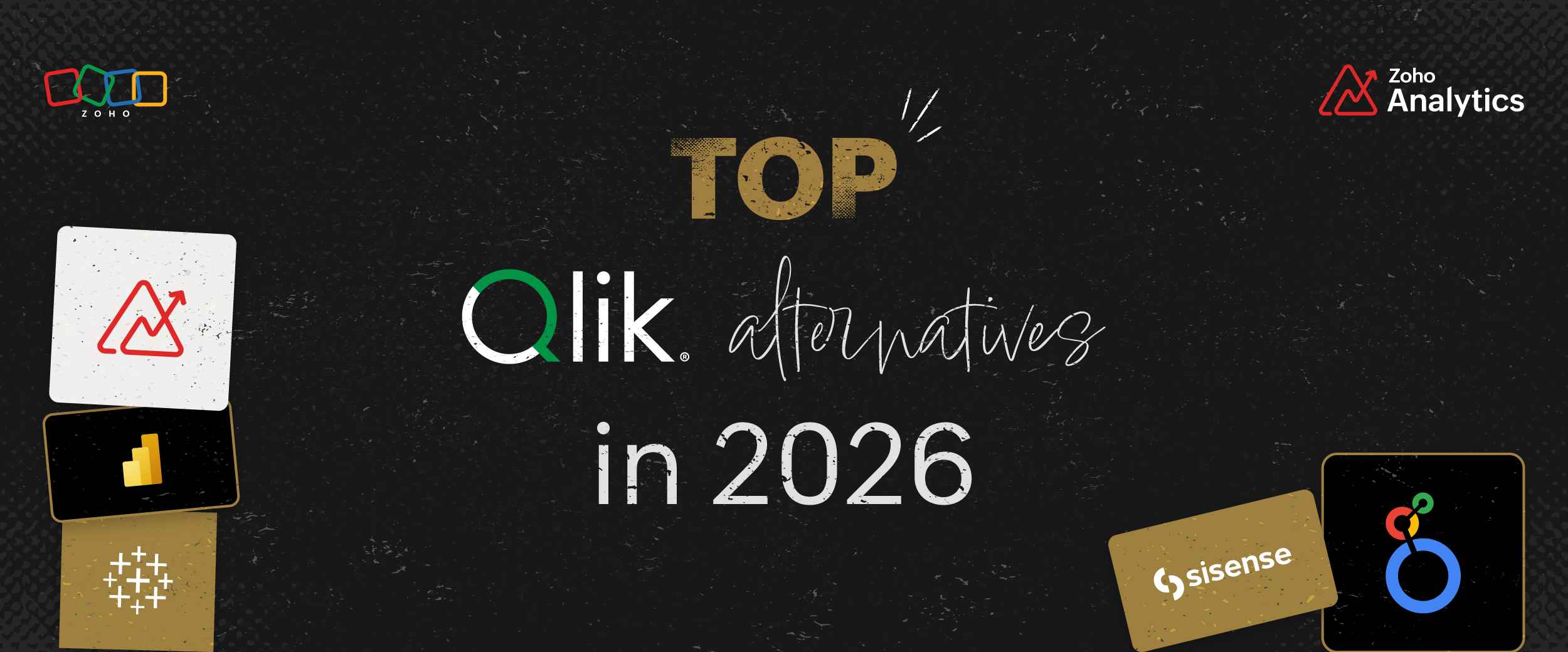
Where Qlik falls short
- Steep learning curve: Reviewers often report that Qlik can be overwhelming for users with limited technical experience.
- High pricing: For smaller businesses, the pricing can be expensive, with extra costs for advanced features.
- Limited collaboration: Even though it's a good analytical platform, its collaborative features can be less intuitive compared to other BI platforms.
Is it just me or does QlikSense genuinely suck?
byu/khalkhall inanalytics
Here are the five best alternatives that can overcome Qlik's limitations:
| Alternative | How it compares to Qlik | Best for |
| Zoho Analytics | AI-powered analytics designed for both business users and analysts 500+ native data connectors and built-in data prep Strong collaboration & mobile support | Businesses of all sizes, looking for an easy-to-use, scalable BI, with AI insights |
| Microsoft Power BI | Seamless integration with Microsoft 365 & Azure ecosystem Advance data modeling Interactive reporting capabilities | Organizations already using Microsoft tools |
| Tableau | Rich dynamic visualizations Both Cloud & on-prem deployments | Users needing advanced visual analytics |
| Sisense | Customizable & embeddable analytics Optimized for handling large datasets | Businesses building analytics directly into their applications |
| Looker | Real-time analytics with strong data governance Native integration with modern data warehouse | Enterprises needing centralized, governed embedded analytics |
1. Zoho Analytics
Zoho Analytics is an AI-powered BI and data analytics platform that allows organizations to create data visualizations and discover hidden insights in just minutes. It's designed to cater to businesses of all sizes and to users from both technical and non-technical backgrounds, enabling you to create dashboards and reports quickly. Learn more.
Why should you choose Zoho Analytics?
500+ native data connectors: Zoho Analytics seamlessly integrates with hundreds of data sources—including cloud business apps, databases, data lakes, cloud storage drives, files, feeds, and web URLs—with automatic data synchronization at regular intervals.
Built-in data preparation: Zoho Analytics lets you clean, model, transform, and enrich your data with a built-in data preparation tool. Automatically identify and create custom data types to detect and correct invalid data.
Intuitive user interface: Create visually appealing reports and dashboards with the drag-and-drop interface. Zoho Analytics automatically creates visualizations based on your data, complete with customization options.
Advanced analytics: With Zia, Zoho's AI-powered assistant, you can get a deeper understanding of your data. It provides actionable insights in both textual and visual formats, highlighting key trends. Leverage the power of AI and uncover hidden insights in just a single click.
Customization and collaboration: With fine-grained access controls, share reports and dashboards with your team. Publish reports and make them accessible to users with or without logging in. Collaborate with colleagues and teams in real time with collaborative analytics.
Native mobile apps: Zoho Analytics has dedicated mobile apps that make analytics easier, allowing reports and dashboards to be accessible anytime, anywhere.
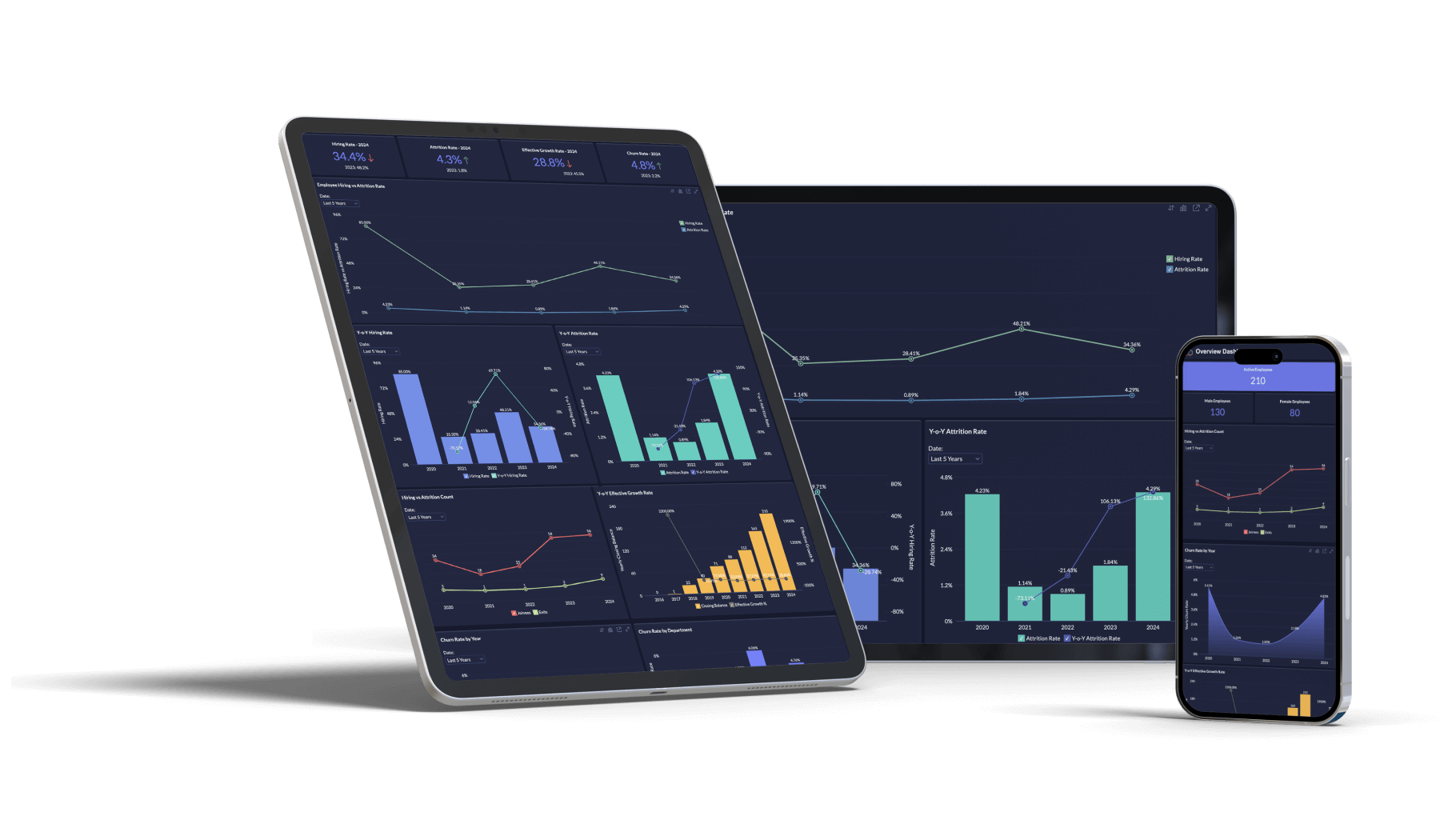
Best for: Businesses of all sizes, organizations prioritizing AI-driven advanced analytics, scalability, and deployment flexibility.
2. Microsoft Power BI
Known for its smooth integration with the Microsoft ecosystem, Power BI provides enterprise-level analytics at a competitive price. It supports a wide range of data sources, from Excel spreadsheets to advanced cloud databases. Power BI's community-driven marketplace offers custom visuals and tools, enhancing its functionality to fit business needs. Explore Power BI alternatives.
Why should you choose Power BI?
Easy integration with the Microsoft ecosystem: For organizations using Office 365, Azure, and Microsoft Dynamics 365, it provides a unified experience across the ecosystem.
Data modeling: Power BI has strong tools for creating detailed data models and performing complex calculations.
Customization: It offers highly customizable and interactive dashboards.
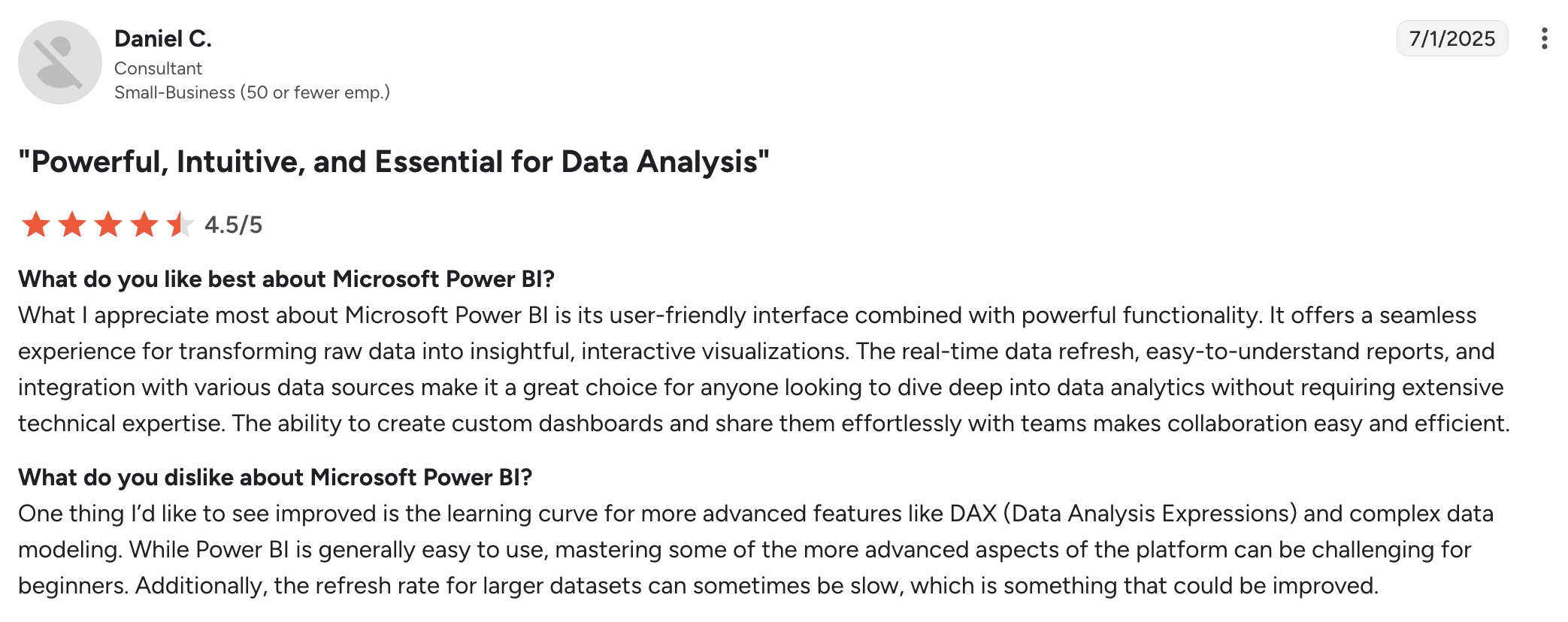
Source:G2
Best for: Businesses using the Microsoft ecosystem.
3. Tableau
Tableau is renowned as the gold standard for data visualization, allowing users to create dynamic dashboards that make data more engaging. Tableau's interface makes it easy for users to generate reports, and its analytical capabilities are enhanced with AI-driven suggestions, making it a good alternative to Qlik. Explore more Tableau alternatives.
Why should you choose Tableau?
Rich visualizations: Tableau lets you easily create reports with minimal effort.
Deployment flexibility: This platform is available on the cloud, on-premises, or as a hybrid solution.
Integration: Tableau supports a wide range of data sources, including cloud services, spreadsheets, and databases.
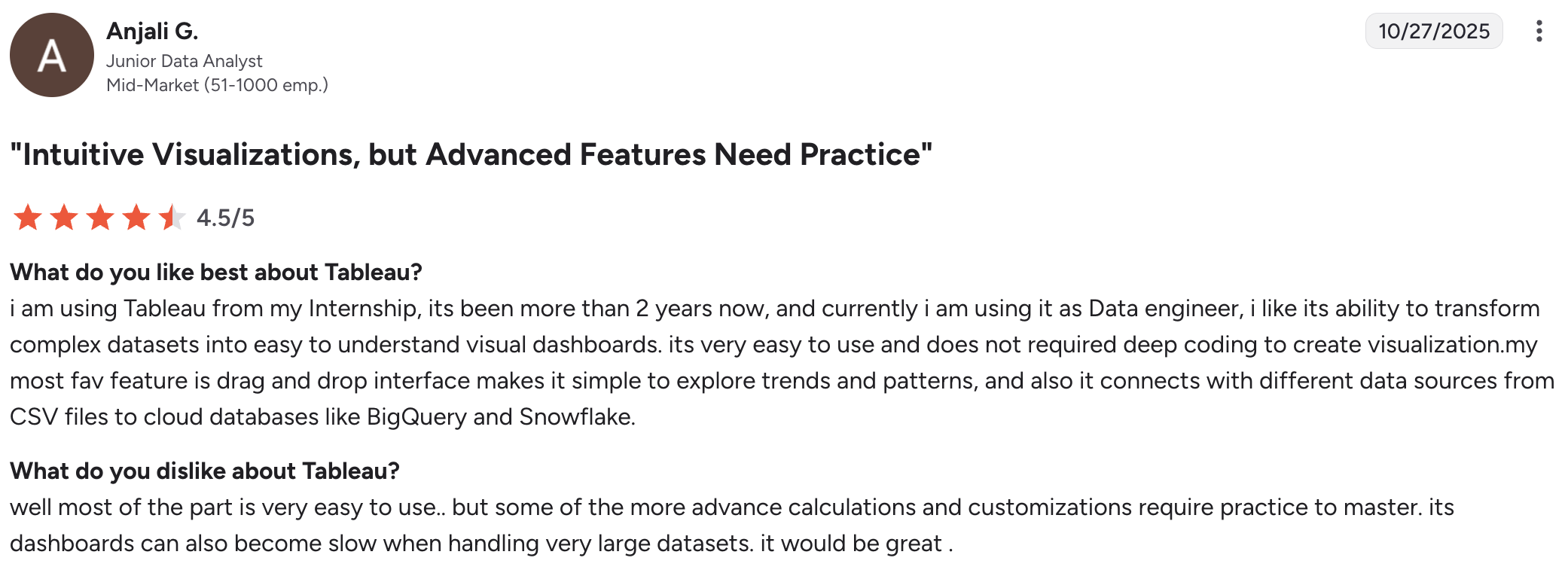
Source: G2
Best for: Users with high technical expertise who require advanced analytics.
4. Sisense
Sisense specializes in embedded and customizable analytics, making it a versatile option for businesses with unique reporting needs. Its powerful technology ensures fast data processing for real-time analytics, even with large datasets. Additionally, with its data preparation tool, complex workflows can be streamlined easily. Explore Sisense alternatives.
Why should you choose Sisense?
Embedded analytics: Sisense stands out with its ability to integrate analytics directly into workflows and applications.
Simplified data preparation: This platform uses string tools for blending and preparing data from various sources.
API flexibility: Sisense lets you leverage APIs to create unique analytics solutions.
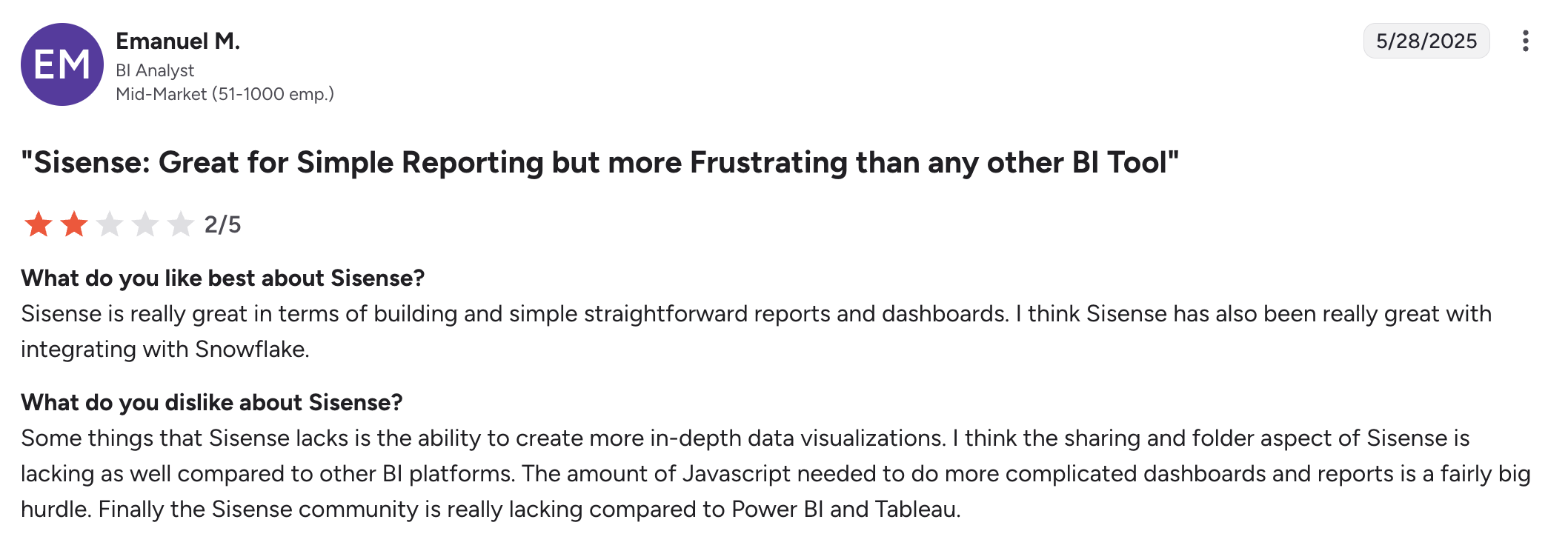
Source:G2
Best for: Businesses that require high customization and embedded analytics in their products or services.
5. Looker
Looker, a part of Google Cloud, offers a cutting-edge approach to business intelligence by focusing on embedded analytics and integration with modern data warehouses. Looker's unique LookML modeling language allows businesses to define and tailor data relationships. Explore Looker alternatives.
Why should you choose Looker?
Embedded analytics: Looker is ideal for software companies and product teams, letting users embed analytics directly into applications.
Google integration: This platform is perfect for organizations already using the Google Cloud platform, offering seamless performance.
Real-time analytics: Looker uses live connections to data sources for up-to-the-minute insights.
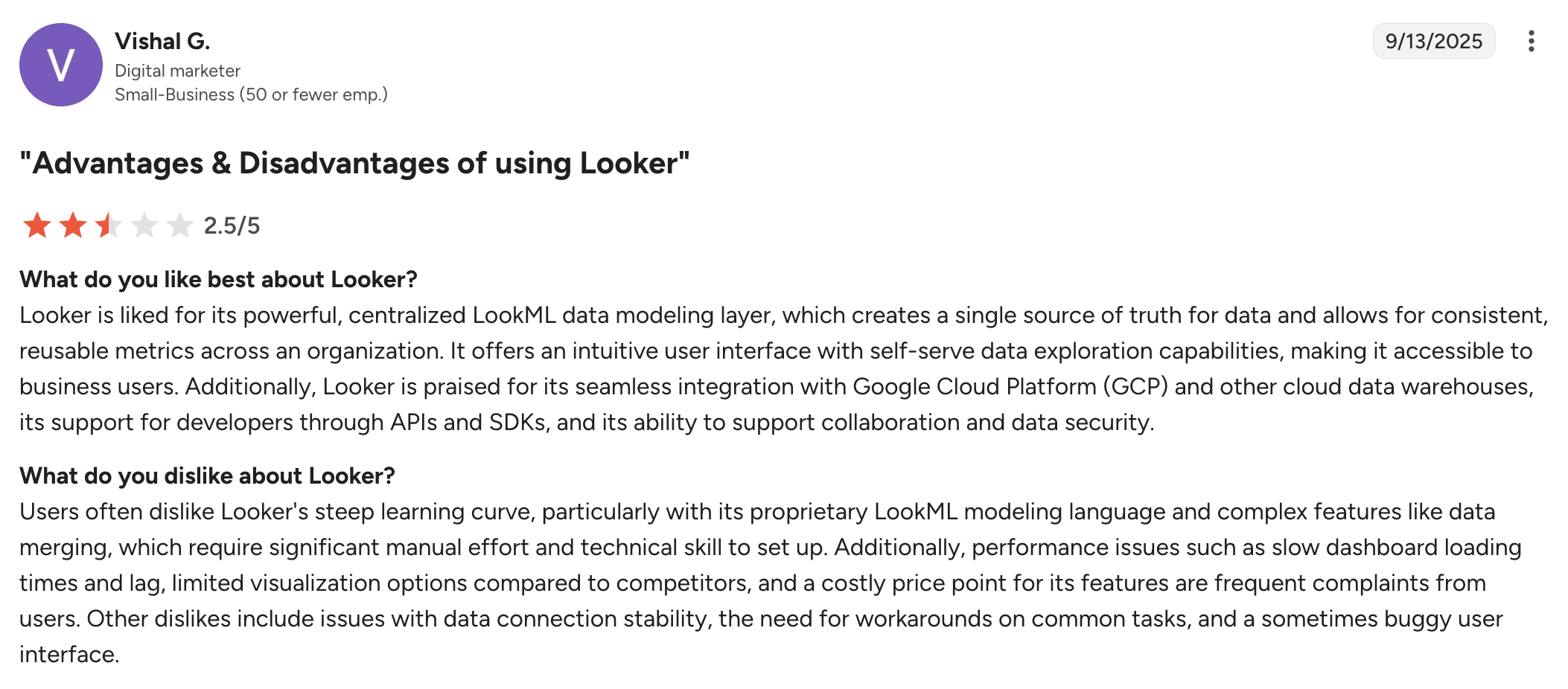
Source:G2
Best for: Enterprises that require highly customizable embedded analytics.
Wrapping up: Zoho Analytics takes the lead
While every BI tool on this list has something unique to offer, Zoho Analytics stands out as the ultimate choice for 2025. With a combination of user-friendliness, affordability, advanced analytics features, and seamless integrations with over 500 data connectors, it wins as the best Qlik alternative. It caters to businesses of all sizes, whether you're a small business looking for an intuitive tool to get started with or a large enterprise in need of a scalable, future-ready platform.
One of Zoho Analytics' defining strengths is Zia, an AI-powered analytics assistant. It simplifies data analysis with conversational queries and predictive insights. This feature ensures that decision-making is not only for data experts but for any team member who can explore trends and uncover actionable insights. Zoho Analytics also offers prebuilt templates, customizable widgets, and robust reporting tools.
Unlike many competitors, Zoho Analytics makes sure that businesses don't have to break the bank to have access to top-tier BI features. From transparent and straightforward pricing plans to enterprise-grade security, Zoho Analytics is a BI tool you can rely on.
In 2025, when scalability, adaptability, and intelligence-driven decision making are more crucial than ever, Zoho Analytics emerges as a clear winner. Transform your raw data into actionable insights today by signing up for our 15-day free trial, or book a personalized demo and see why Zoho Analytics is the best BI platform for 2025!
Data done right with Zoho Analytics!
 Vinisha
VinishaVinisha is a Marketing Analyst at Zoho Analytics with a strong passion for both marketing and data. She’s naturally curious about trends and loves diving into data to uncover what drives effective campaigns. She has a knack for simplifying complex information and presents insights in a relatable and engaging way that connects with audiences. Outside of work, she enjoys exploring the creative side of digital marketing.
